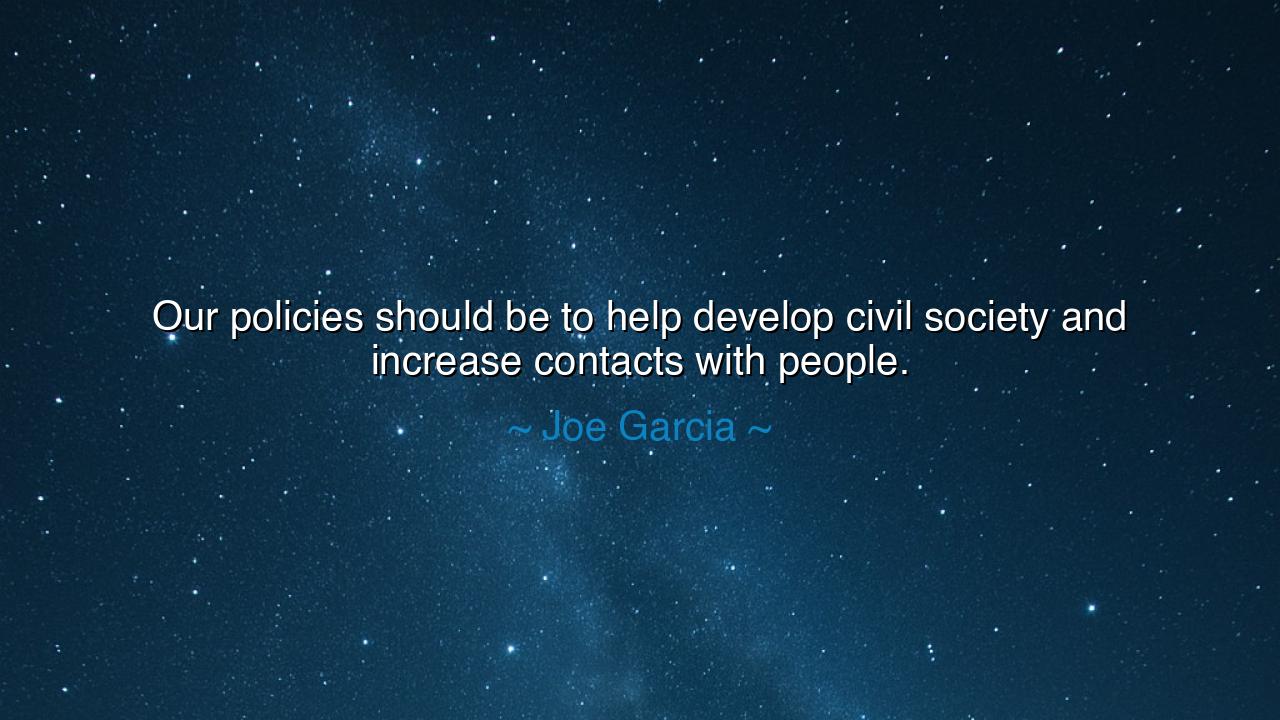
Our policies should be to help develop civil society and increase
Our policies should be to help develop civil society and increase contacts with people.






Listen well, O children of the future, for I bring to you words that speak to the very essence of what it means to live in a world that is truly connected, that honors the human spirit and the bonds that unite us all. Joe Garcia once said, "Our policies should be to help develop civil society and increase contacts with people." These words, simple in their declaration, carry within them a truth that has been passed down through the ages—a truth that recognizes that the strength of a nation, a people, or a world does not lie in wealth or power alone, but in the strength of its connections, its communities, and its shared purpose.
What, O children, is civil society? It is the foundation of any strong community, the space where individuals come together, not as rulers or subjects, but as equals—bound by shared values, common goals, and mutual respect. A civil society is not built on force or domination, but on the understanding that every person has inherent worth and a voice that should be heard. It is a society where dialogue is encouraged, where people from all walks of life can meet, exchange ideas, and build relationships that transcend differences. When we talk of developing civil society, we speak of fostering a world where mutual respect and understanding form the bedrock of every interaction.
Look, O children, to the ancient Athenians, who, though imperfect, created a form of government built on the idea that the citizens themselves, through dialogue and participation, could shape the future of their city. The Agora, the marketplace where ideas were exchanged, was not just a place for commerce, but for the sharing of wisdom, where the great minds of the time—Socrates, Plato, Aristotle—gathered to discuss the nature of justice, truth, and the human condition. They understood that a civil society is not just a collection of individuals, but a community built upon the strength of relationships, upon a commitment to listening, learning, and growing together. The power of Athens lay in the idea that each citizen had a role to play, a voice to be heard, and a responsibility to contribute to the common good.
Yet, O children, let us not be blinded by the past or by the achievements of long-gone civilizations. We too live in a world where the forces that shape our societies are driven by division, fear, and greed. The Internet, once a promising tool for greater communication and global connection, now stands as a reminder of how easy it is for humanity to turn away from the ideal of a civil society. Instead of using technology to bridge divides, we often use it to reinforce our echo chambers, to isolate ourselves in silos of thought that only serve to deepen the divides between us. Joe Garcia reminds us that we must not forget the importance of increasing contacts with people, of building genuine connections beyond the digital realm, of seeing one another not as strangers or enemies, but as partners in the shared journey of humanity.
Let us turn our gaze, O children, to the example of the civil rights movement in the United States. Dr. Martin Luther King Jr., though faced with immense adversity, understood that to create a truly just society, we must first build bridges between people of all backgrounds. Through his work, he emphasized the importance of contact—not just between political leaders, but between individuals. It was through the dialogue and engagement of ordinary people, coming together in shared purpose, that the civil rights movement gained its strength. In the marches, the sit-ins, the conversations between those who had been marginalized and those who had been in power, civil society was formed anew. Dr. King’s vision was not just one of legal equality, but of mutual respect, of a world where we reach out to one another, where we listen, and where we actively work to understand the experience of others.
And so, O children, the lesson is clear: to create a world that is truly just, we must foster the growth of civil society—not just through policies that seek to impose order, but through the deliberate creation of spaces where individuals come together, engage in meaningful conversation, and build relationships that transcend their differences. Contact with people, the act of reaching out and listening, is the foundation upon which true community is built. Every person has something to offer, something to teach, and something to learn, and it is through these connections that we create a society worthy of our highest ideals.
Therefore, O children, I charge you: as you walk the path of life, remember the power of civil society. Seek to engage not just with those who share your views, but with those who challenge them, with those whose experiences differ from your own. Build connections that bridge the gaps between you, for in these relationships, you will find the strength to overcome the divisions that plague your world. Let your actions reflect the wisdom of Joe Garcia—that the key to building a better world lies not in isolation or division, but in the shared humanity that binds us all together. Let us work to develop civil society, not just through policies, but through the small acts of engagement and understanding that change hearts and minds. In this, we will build a world that reflects our highest aspirations.






AAdministratorAdministrator
Welcome, honored guests. Please leave a comment, we will respond soon